 |
| |
News | Events | Commentaries | Publications
|
News
|
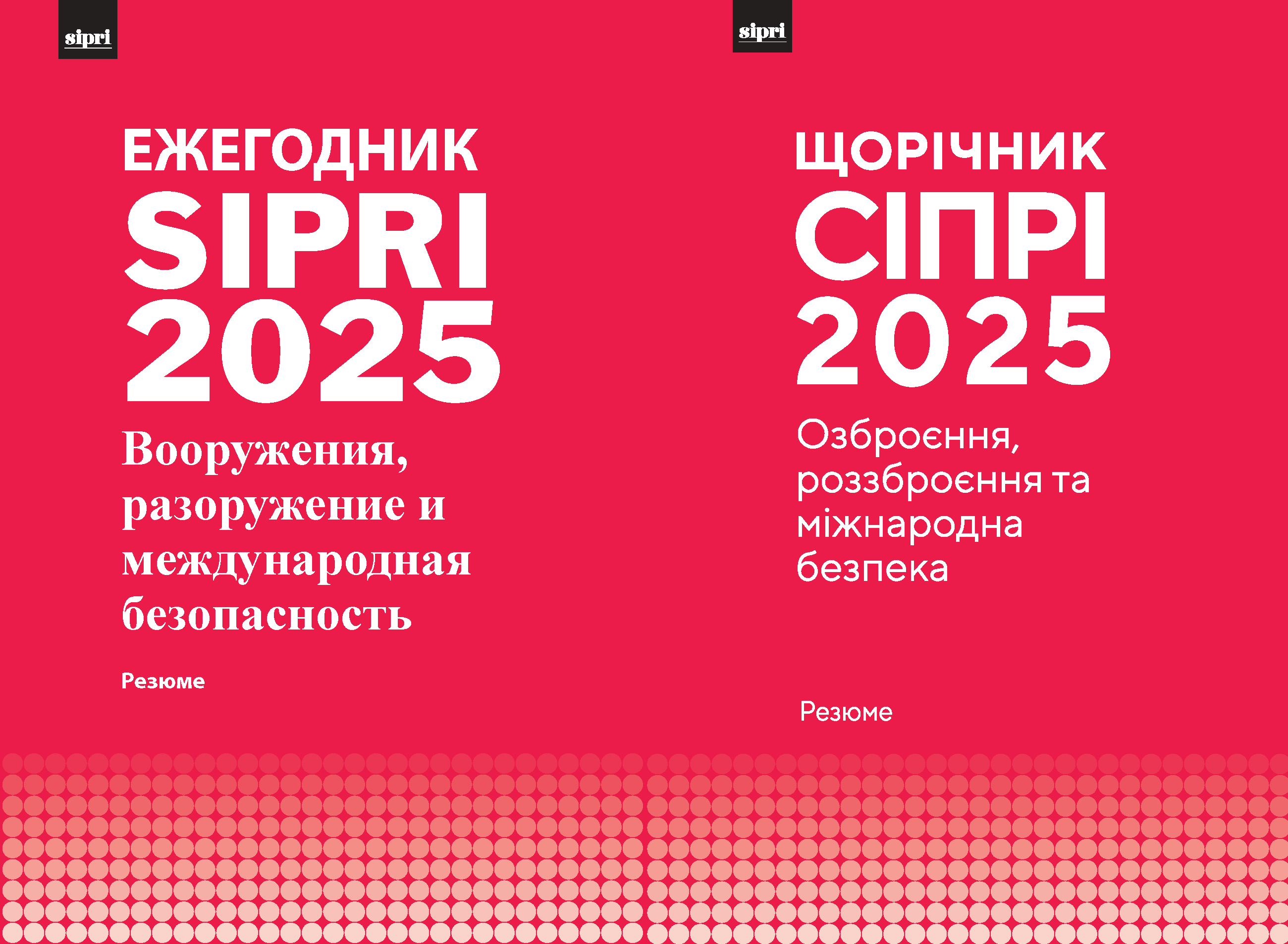 |
SIPRI Yearbook 2025 summary now available in Russian, Ukrainian and seven other languages
As part of SIPRI’s efforts to counter disinformation, the summary of SIPRI Yearbook 2025 is now available in English, Arabic, Catalan, Chinese, Dutch, Russian, Spanish, Swedish and Ukrainian. SIPRI is grateful to its translation partners: the Centre for Arab Unity Studies (Arabic), the Flemish Peace Institute (Dutch), FundiPau (Catalan and Spanish) and the Razumkov Centre (Ukrainian Centre for Economic and Political Studies) (Ukrainian).
Read more | Download the summaries
|
|
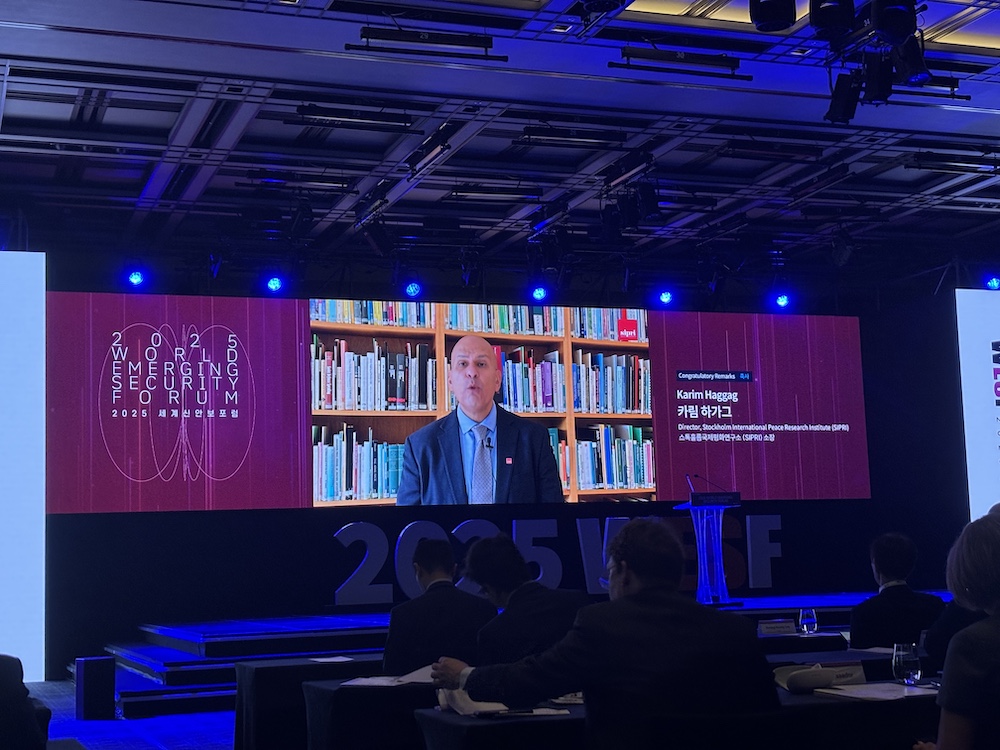 |
SIPRI at the 2025 World Emerging Security Forum in Seoul
On 8 September, researchers from SIPRI participated in the 2025 World Emerging Security Forum, held in Seoul, South Korea, bringing SIPRI expertise on emerging military and security technologies—including quantum and AI-related risks—directly into the forum’s policy discussions. The theme of the forum this year was ‘The Evolution of Hybrid Threats and International Security’, and Karim Haggag, SIPRI Director, provided congratulatory remarks via video to the opening ceremony. Haggag emphasized the importance of the topics and SIPRI’s ongoing engagement with the forum.
Read more
|
|
 |
SIPRI joins European Commission quantum committee
SIPRI is pleased to announce that Dr Michal Krelina, SIPRI Associate Senior Researcher, will represent SIPRI on the Strategic Advisory Board to the European Commission’s Quantum Flagship initiative. Launched in 2018, the Quantum Flagship is a long-term research and innovation initiative that aims to put Europe at the forefront of the second quantum revolution. The Strategic Advisory Board helps the European Commission implement its Quantum Strategy and the Quantum Act and align them with the Quantum Flagship’s activities.
Read more | Read the latest SIPRI Report on quantum technologies
|
|
 |
SIPRI contributes to global UN report on military expenditure
The UN Secretary-General released a new report this month warning of the dangers of rising military spending. The report, ‘The Security We Need: Rebalancing Military Spending for a Sustainable and Peaceful Future’, draws extensively on SIPRI data and analysis to highlight the global implications of rising military expenditure and calls for a fundamental shift in global priorities.
Read more | Read the report | Watch the discussion on the topic at the UN
|
|
 |
SIPRI expert contributes to military AI toolkit
On 4 September, the project ‘AutoPractices’, hosted by the Centre for War Studies at the University of Southern Denmark in collaboration with SIPRI, launched a report on military artificial intelligence (AI). ‘Map of Practices’ is the first step towards developing a cutting-edge toolkit to sustain and strengthen human agency and accountability in AI technologies. Dr Alexander Blanchard, Senior Researcher in the SIPRI Governance of AI Programme, contributed significantly to the project, which aims to initiate a bottom-up process of social innovation to govern AI technologies in military systems.
Read more | Read the report
|
|
 |
SIPRI expert to advise Swedish UN agency
SIPRI is pleased to announce that it will join the Swedish Food and Agriculture Organization of the United Nations (FAO) to provide advice on issues such as food, peace and security. SIPRI will be represented by Dr Caroline Delgado, Director of the SIPRI Food, Peace and Security Programme, whose work focuses on sustainable peace and the food–peace–security nexus. The Swedish FAO Committee is tasked with assisting the Swedish government in its work on food security.
Read more
|
|
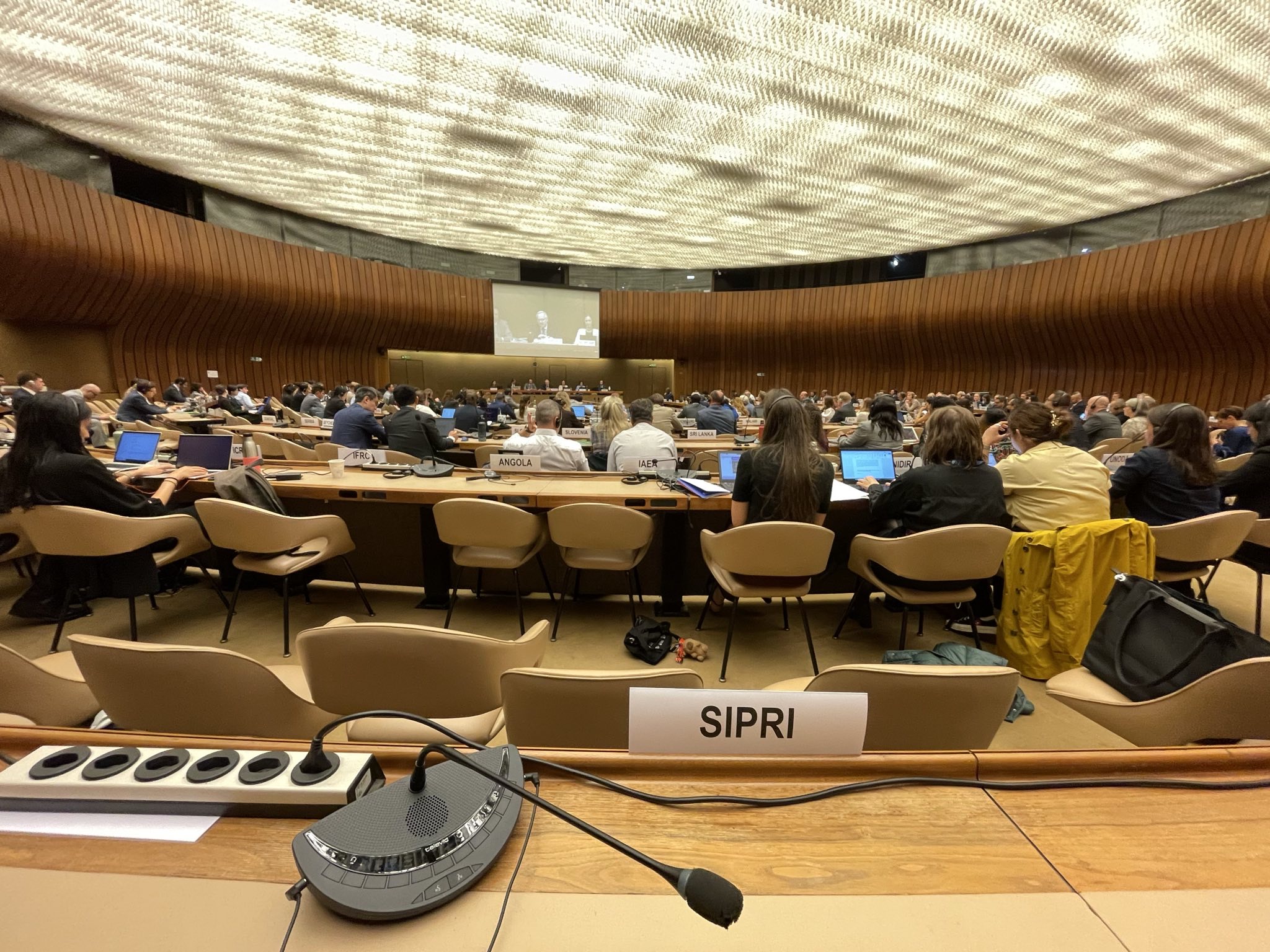 |
SIPRI experts join UN meeting on autonomous weapon systems
On 1–5 September, researchers from SIPRI’s Governance of AI Programme took part in a UN meeting focused on autonomous weapon systems. The meeting was held in Geneva within the framework of the Convention on Certain Conventional Weapons Group of Governmental Experts on Lethal Autonomous Weapon Systems (LAWS). Researcher Laura Bruun and Senior Researchers Dr Alexander Blanchard and Netta Goussac monitored the debate, which aimed to build consensus around the characteristics of LAWS and the requirement for the human element in the use of LAWS.
Read more | Read a recent SIPRI Report on AWS
|
|
|
Recent events
|
Exploring AI’s role in peacebuilding and development in West Africa
11 September 2025
SIPRI co-hosted a virtual event examining the role of AI in humanitarian and development efforts across West Africa. The event was conducted as part of SIPRI’s ongoing work in the Research & Action for Peace Network with SIPRI’s consortium partners: the Danish Refugee Council and the West Africa Network for Peacebuilding. The event aimed to foster dialogue on the role of AI in early warning systems, conflict prevention and climate security, particularly in fragile and conflict-affected settings.
Read more
|
|
SIPRI co-hosts workshop on the future of conflict management in Africa
2–4 September 2025
SIPRI and the Friedrich-Ebert-Stiftung jointly hosted a regional workshop in Addis Ababa, Ethiopia, bringing together experts and practitioners to explore the future of conflict management in Africa. Participants discussed whether regional organizations are equipped to address the challenges facing conflict management actors in Africa over the next ten years. Topics also included how to ensure that future conflict management is fit for purpose.
Read more
|
|
SIPRI co-hosts 2025 Armament and Disarmament Summer School
24–29 August 2025
In August, SIPRI and its partners hosted the Armament and Disarmament Summer School, an annual initiative that provides a learning and networking space for early-career professionals working in disarmament, non-proliferation and arms control. This year’s programme welcomed 23 participants from 19 countries. SIPRI experts delivered lectures on key disarmament topics, and participants took part in hands-on workshops focused on policy writing and effectively communicating research to the media.
Read more
|
|
SIPRI hosts virtual launch event for new report on bias in military AI
29 August 2025
SIPRI hosted a virtual event to launch the new report ‘Bias in Military AI and Compliance with International Humanitarian Law’. The report supports efforts to better understand and address the risks posed by bias in military AI. The event provided an opportunity for the public to gain insights into the report’s recommendations and engage directly with experts on military AI.
Read more | Read the report
|
|
SIPRI co-hosts workshop in Helsinki on environmental risks and regional stability
28 August 2025
As part of Finland’s presidency of the Nordic Council of Ministers, SIPRI and the Finnish Institute of International Affairs co-hosted a workshop in Helsinki to explore the intersection of environmental risks and regional security. The workshop highlighted the need for a comprehensive approach to security that integrates environmental dimensions into preparedness and resilience strategies.
Read more
|
|
SIPRI co-convenes roundtable on Korean Peninsula security
21 August 2025
SIPRI, in partnership with the Swedish Institute of International Affairs, convened a roundtable in Stockholm to examine shifting security dynamics in North East Asia with a focus on the Korean Peninsula. Discussions brought together senior policy practitioners and analysts to explore the evolving nuclear landscape, options for reducing escalation risks and the importance of sustained dialogue with the Democratic People’s Republic of Korea (DPRK, or North Korea).
Read more
|
|
SIPRI Chair addresses the nuclear threat at the Nobel Peace Conference
6 August 2025
Stefan Löfven, Chair of the SIPRI Governing Board and former Prime Minister of Sweden, participated in a panel discussion in Oslo, Norway, at the Nobel Peace Conference on 6 August that examined current nuclear risks and pathways to avoid a renewed arms race. The panel, titled ‘The Nuclear Threat Anno 2025—Can We Avoid a New Nuclear Arms Race?’, brought together policymakers, Nobel laureates and civil-society activists to reflect on nuclear dangers in a time of elevated international tension and measures to strengthen norms and institutions that prevent nuclear use.
Read more
|
|
|
|
|
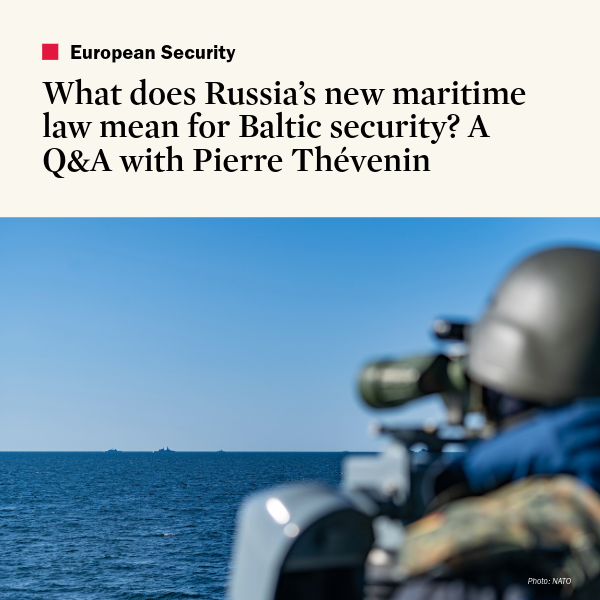 |
What does Russia’s new maritime law mean for Baltic security? A Q&A with Pierre Thévenin
On 18 June 2025, Russia adopted a set of new maritime ‘baselines’ in the Baltic Sea, effectively dictating where foreign ships can and cannot sail in the vicinity of Russia’s coast. The question of exactly where Russia’s various maritime zones lie in the Baltic has become particularly salient since Russia’s full-scale invasion of Ukraine in 2022. There are also strong suspicions in Europe and elsewhere that Russia is operating a ‘shadow fleet’ of oil tankers to evade international sanctions. In this Q&A, Dr Pierre Thévenin explains what Russia’s new law says and its implications for peace and security in the Baltic.
Read the SIPRI Topical Backgrounder
|
|
 |
SIPRI experts were recently featured in these external outlets:
-
‘Evaluating the Alignment Between Budgetary Allocations and National Security Priorities. Exploratory Case Study: Kenya’, Alexandra Kuimova, Anabel García García, Zubaida Karim and Nan Tian, published by the UN Institute for Disarmament Research on 17 September 2025.
-
‘“Constant care” must be taken to address bias in military AI’, Laura Bruun and Marta Bo, published in the International Committee of the Red Cross Humanitarian Law & Policy Blog on 29 August 2025.
-
‘Echoes in the current – Water, conflict, and the elusive hope for environmental peacebuilding in a warming world’, Florian Krampe, published in the Bled Strategic Times in August 2025.
|
|
|
Publications
|
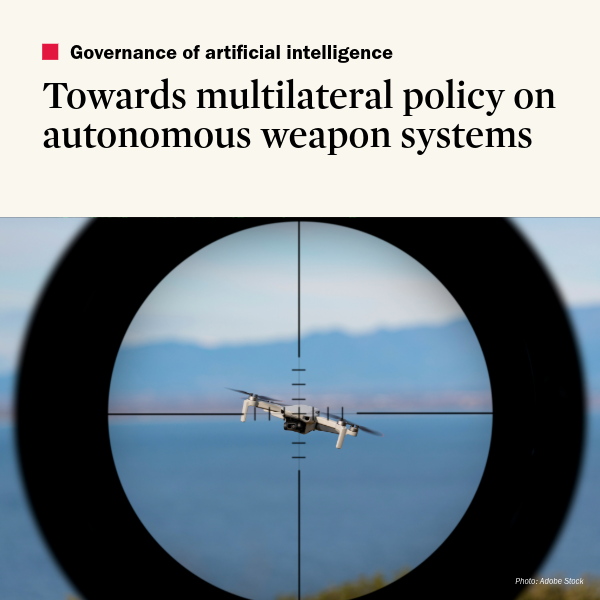 |
Towards Multilateral Policy on Autonomous Weapon Systems
Over a decade of deliberations on AWS has yielded limited progress, with states divided on definitions, regulatory approaches and pathways for action. The resulting landscape is one of institutional complexity, political sensitivity and growing urgency. This report examines possible directions for multilateral policy on AWS and aims to equip policymakers with a structured and realistic overview of possible next steps to assist them to advance multilateral policy efforts.
Read the SIPRI Report
|
|
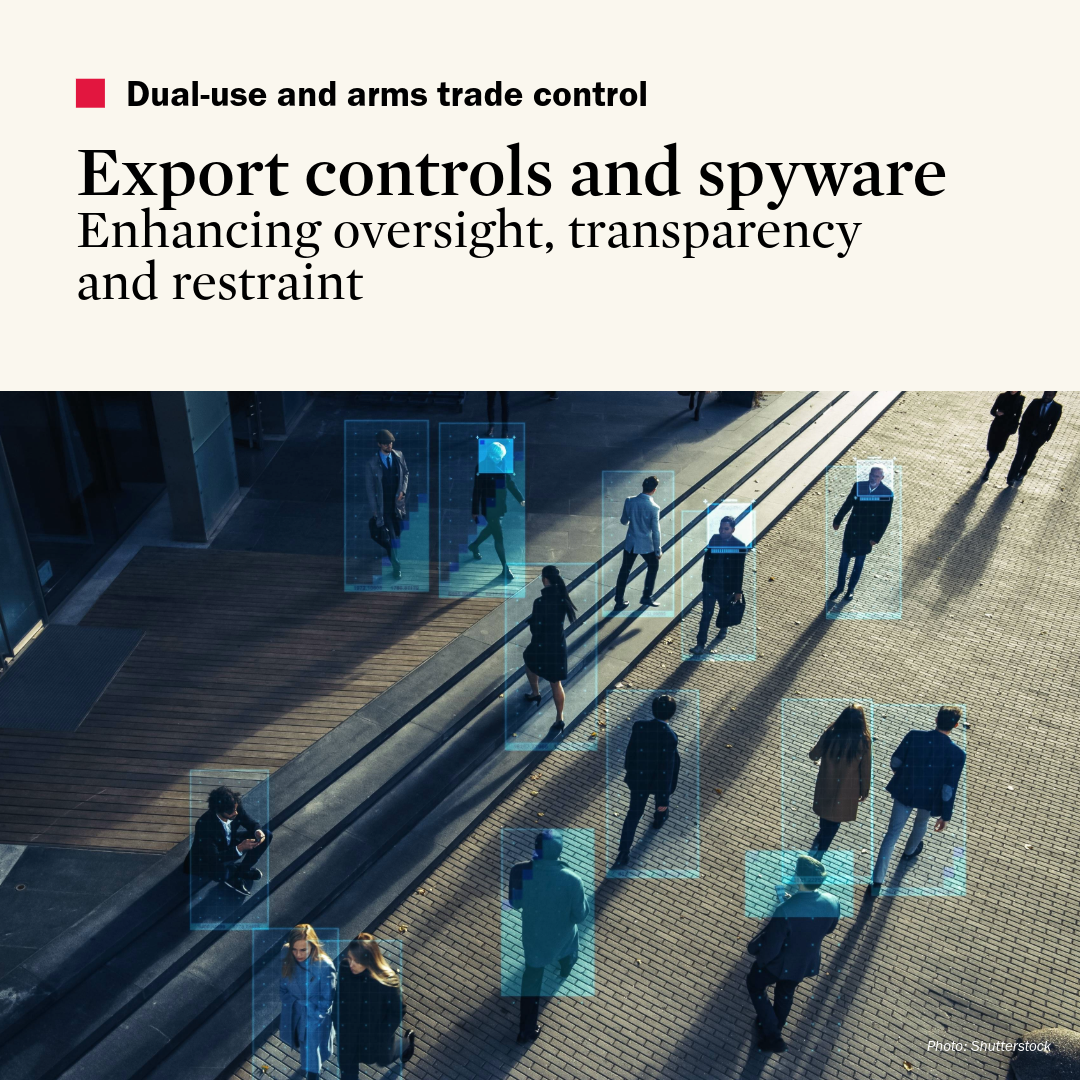 |
Export Controls and Spyware: Enhancing Oversight, Transparency and Restraint
The proliferation and misuse of spyware and other cyber-surveillance tools pose significant threats to human rights and national security. This report reviews the content of the export controls and sanctions that have been applied to the trade in spyware and other cyber-surveillance tools and outlines recommendations on how they could be strengthened, expanded and harmonized. The analysis is supported by a detailed study of the types of spyware and other cyber-surveillance tools that have been captured by export controls and sanctions, and a mapping of the location of the companies that produce these tools.
Read the SIPRI Report | Explore the interactive map
|
|
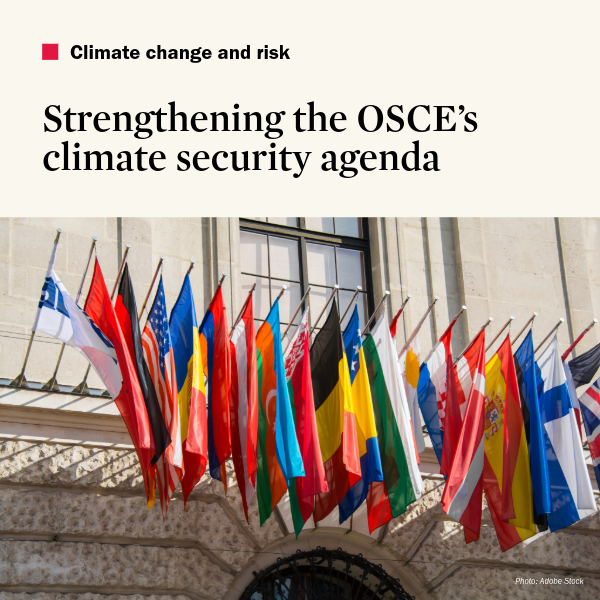 |
Strengthening the OSCE’s Climate Security Agenda
Despite a clear mandate, the Organization for Security and Co-operation in Europe’s (OSCE) approach to climate security is yet to reach its full potential. An analysis of the current strategy shows that while the OSCE has strengths, such as a comprehensive security mandate and a grassroots presence through its field operations, its effectiveness is undermined by weaknesses, such as geopolitical distractions, a tendency to focus on general environmental work rather than security and poor integration between headquarters and field missions. This policy brief provides recommendations to strengthen the work of the OSCE.
Read the SIPRI Policy Brief
|
|
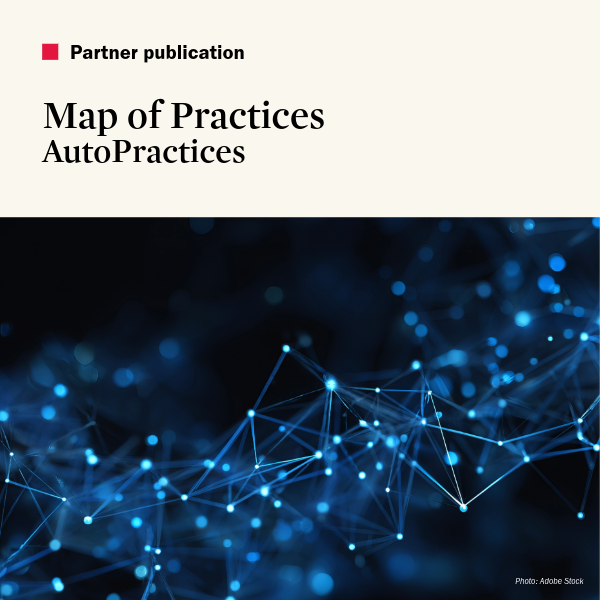 |
Map of Practices: AutoPractices
The project ‘AutoPractices’, hosted by the Centre for War Studies at the University of Southern Denmark in collaboration with SIPRI, aims to initiate and accompany a process of social innovation to govern AI technologies in military systems from the bottom up. It will do so by co-creating a toolkit to sustain and strengthen the exercise of human agency when developing and using military systems integrating AI and autonomous technologies. This map is the first step of the project, and it identifies current practices in the design and use of AI technologies in military systems, as well as how personnel are trained.
Read the partner publication
|
|
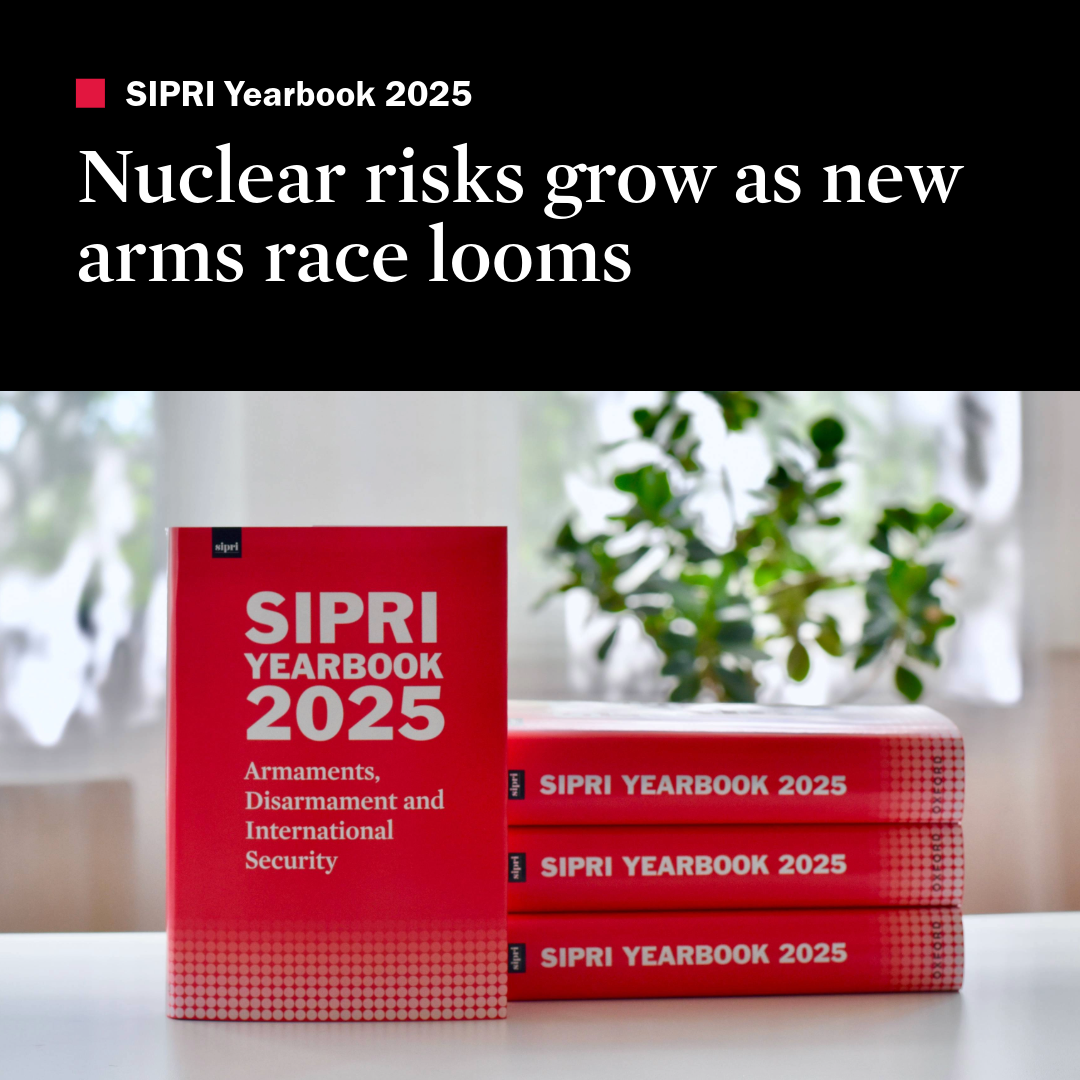 |
SIPRI Yearbook 2025
The SIPRI Yearbook presents a combination of original data in areas such as world military expenditure, international arms transfers, arms production, nuclear forces and armed conflicts with state-of-the-art analysis of important aspects of arms control, peace and international security.
SIPRI Yearbook 2025, which is the latest edition and covers key developments in 2024, includes:
- detailed coverage of nuclear arms control and non-proliferation issues;
- insight on developments in conventional arms control;
- regional overviews of armed conflicts and conflict management;
- in-depth data and discussion on military expenditure, international arms transfers, arms production and world nuclear forces;
- analysis of the growing proliferation of missiles and uncrewed aerial vehicles;
- a focus on international governance of AI, cyberspace and space security; and
- comprehensive coverage of efforts to counter chemical and biological security threats.
Browse the contents page | Download the summary (PDF) | Download the sample chapter on world nuclear forces (PDF) | Download the introductory chapter (PDF) | Order SIPRI Yearbook 2025
|
|
|
|
|
|
Accurate, dependable information is more important than ever. Invest in the facts.
Support SIPRI
|
|
 |
| SIPRI is an independent international institute dedicated to research into conflict, armaments, arms control and disarmament. Established in 1966, SIPRI provides data, analysis and recommendations, based on open sources, to policymakers, researchers, media and the interested public. |
|
|